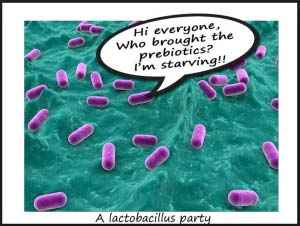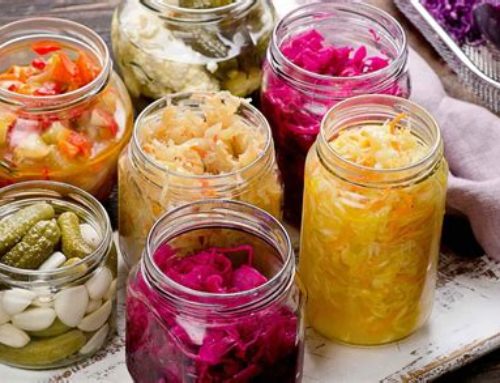Good health starts in the gut! It is one of the
fundamental Naturopathic principles that  really stood the test of time. Long before we had the technology to see, let alone identify specific strains of probiotics, ancient civilisations have known the benefits of fermented foods. Longevity and good health are common amongst people that regularly consume traditional fermented products like yoghurt, sauerkraut, kim chi, tempeh and kefir alongside a healthy diet and lifestyle.
really stood the test of time. Long before we had the technology to see, let alone identify specific strains of probiotics, ancient civilisations have known the benefits of fermented foods. Longevity and good health are common amongst people that regularly consume traditional fermented products like yoghurt, sauerkraut, kim chi, tempeh and kefir alongside a healthy diet and lifestyle.
More commonly in our society we are taught to avoid all bacteria and bugs and are encouraged to use antibacterial hand washes, disinfectants and sanitisers on a daily basis…bacteria are the enemy! We are prescribed antibiotics ever more increasingly, which effectively kill off our protective little guys along with the bad. Added to this, a typical Western diet compounds the problem, supplying little in the way of fermented foods and often being high in refined sugar and saturated fats and low in fibre.
What we need to know is that bacteria (the right bacteria) can also be our friend. Did you know that a large part of your immune response occurs in the gut? Did you know the the number of microorganisms that live in our gut outnumber all of the other cells in our body ten times over? In fact it is probably more accurate to see this delicate ecosystem, our microbiota, as an organ in it’s own right. As the latest research shows, it has more of an impact on our health than we ever realised. It’s time to find out how to help our own army of ‘superbugs’ work for us!
The health of our gut is so essential in digestion and absorption of our foods, proper elimination of toxins, maintaining a strong immune system, producing essential vitamins like B’s and K and supporting healthy serotonin levels amongst other things.
 The word probiotic is not so new. Many of us have seen the ads on TV which feature the little blue guys helping to restore balance to our system when we’ve had too much rich food, antibiotics or other medication. In fact, we’ve been using supplemental probiotics for a long time to support gut health. Specific strains of probiotics are commonly used to treat diarrhoea, constipation or alternating bowel habits, bloating, flatulence and discomfort. They are also helpful in preventing traveller’s diarrhoea and in treating pathogens like candida.
The word probiotic is not so new. Many of us have seen the ads on TV which feature the little blue guys helping to restore balance to our system when we’ve had too much rich food, antibiotics or other medication. In fact, we’ve been using supplemental probiotics for a long time to support gut health. Specific strains of probiotics are commonly used to treat diarrhoea, constipation or alternating bowel habits, bloating, flatulence and discomfort. They are also helpful in preventing traveller’s diarrhoea and in treating pathogens like candida.
But evidence is now showing a role for their use in allergy, weight loss, inflammation, strengthening immunity and even helping to improve mood and behaviour. It is only recently that science is showing how important it is to choose the right bug for the right job. Scientists now estimate over 1000 different species of microflora live in our gastrointestinal tract and then to be even more specific, we can further differentiate them into individual strains. Even within the same species, bacteria can exhibit very different features from strain to strain. So, it is very important to get the right advice about which strain (or combination of strains) is right for you and your individual needs.
No one probiotic can do it all and no two are exactly alike…kind of like us!
Unfortunately, contrary to some misinformation, supplemental probiotics do not colonise and stay forever in your gut. The best ones stay for a period of time, helping to create a better environment and allowing your own system to repopulate and correct the underlying imbalance. Sometimes it may be necessary to take probiotics long term or periodically and include fermented products in your diet to correct more severe or chronic problems.
Just like all living things, probiotics need food to survive and thrive. These specific nutrients are called
 prebiotics and will usually be recommended by your practitioner to improve the effectiveness of your probiotic supplement. Other helpful colonic foods (though not strictly prebiotics) that support correct microflora balance include fibres like: slippery elm, psyllium and pectin. Eating a diet rich in vegetables (especially green leafy ones), fruit, nuts, seeds and whole grains will also ensure you are getting lots of fibre from your food and maintaining a healthy bowel.
prebiotics and will usually be recommended by your practitioner to improve the effectiveness of your probiotic supplement. Other helpful colonic foods (though not strictly prebiotics) that support correct microflora balance include fibres like: slippery elm, psyllium and pectin. Eating a diet rich in vegetables (especially green leafy ones), fruit, nuts, seeds and whole grains will also ensure you are getting lots of fibre from your food and maintaining a healthy bowel.
Always, prevention is the best medicine. So, eating a healthy, well balanced diet, which includes some fermented foods and plenty of fibre, drinking good quality water and exercising regularly is the basis for good gut health. But, if you need a more therapeutic approach, for a more serious or long standing complaint, why not come in for a consultation to discuss how probiotics may be able to play a role in helping you back to optimum health.
©Luisa Harvey ND B.H.Sc.Nat., Adv.Dip.H.M., Adv.Dip.Nut.




Leave A Comment